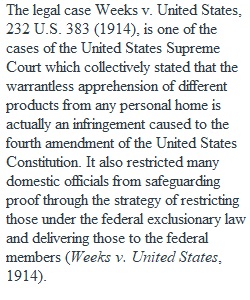


Q Chapter Two Discussion aligns with the following chapter-level objective: 1. Explain the meaning of due process of law, and identify where due process guarantees can be found in American Law Before completing the assignment, you should read the following references: References: McKee, A.J. (2018). The Political and Legal Environment of Criminal Justice. In Criminal Justice: An Overview of the System. Retrieved from https://www.docmckee.com/WP/cj/criminal-justice-an-overview-of-the-system/criminal-justice-introduction-to-chapter-2/ Link (Links to an external site.) McKee, A.J. (2018). Weeks v. United States (1914). In Fundamental Cases in Criminal Justice. Retrieved from https://www.docmckee.com/WP/cj/fundamental-cases-in-criminal-justice/weeks-v-united-states-1914-232-u-s-383/ Link (Links to an external site.) You should then discuss the following: 1. Which amendment is highlighted in the case of Weeks vs. United States? 2. Considering the Crime Control model and Due Process models in criminal justice. Which model was depicted in this case? Explain your answer Guidelines for discussion forums: For each discussion forum, you should be sure to address the discussion topic in 6-8 sentences. You should use at least two credible sources in the initial post and cite those sources according to APA guidelines. You must also respond to at least two peers. Each peer response should be between 4-6 sentences. In peer responses, you should cite at least one credible source and the source should be cited according to APA guidelines.
View Related Questions